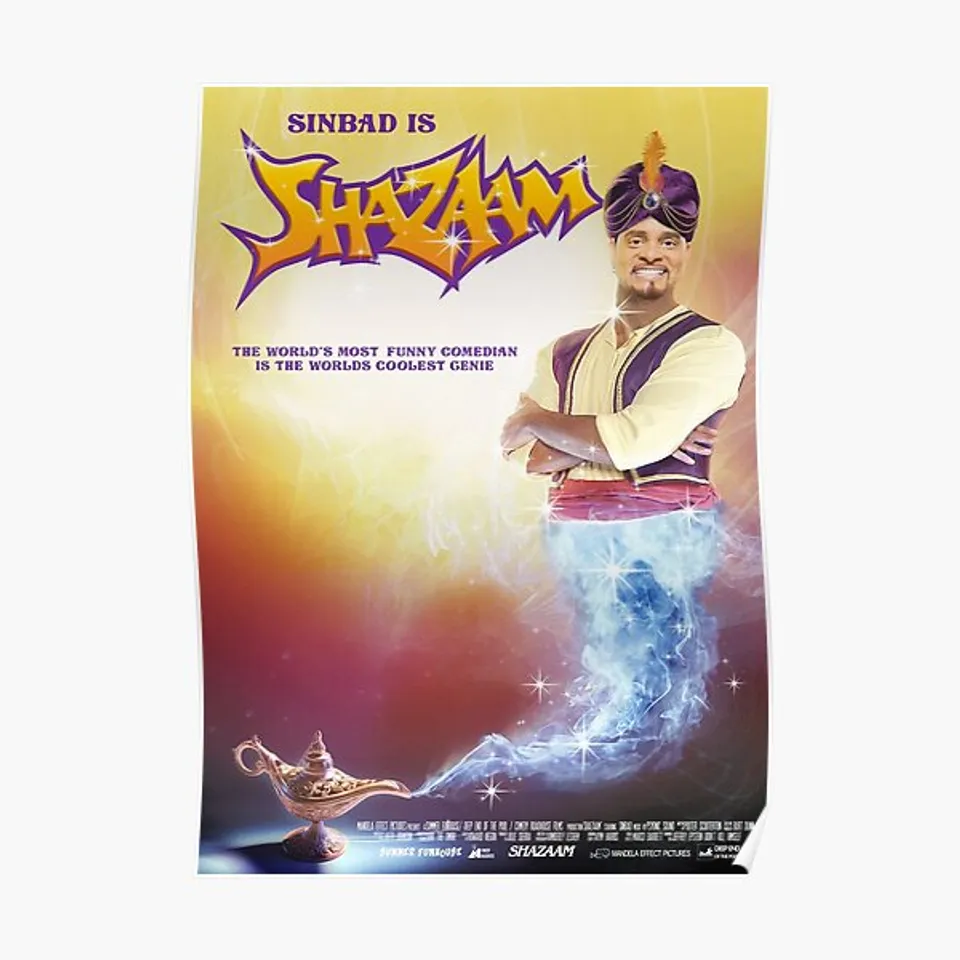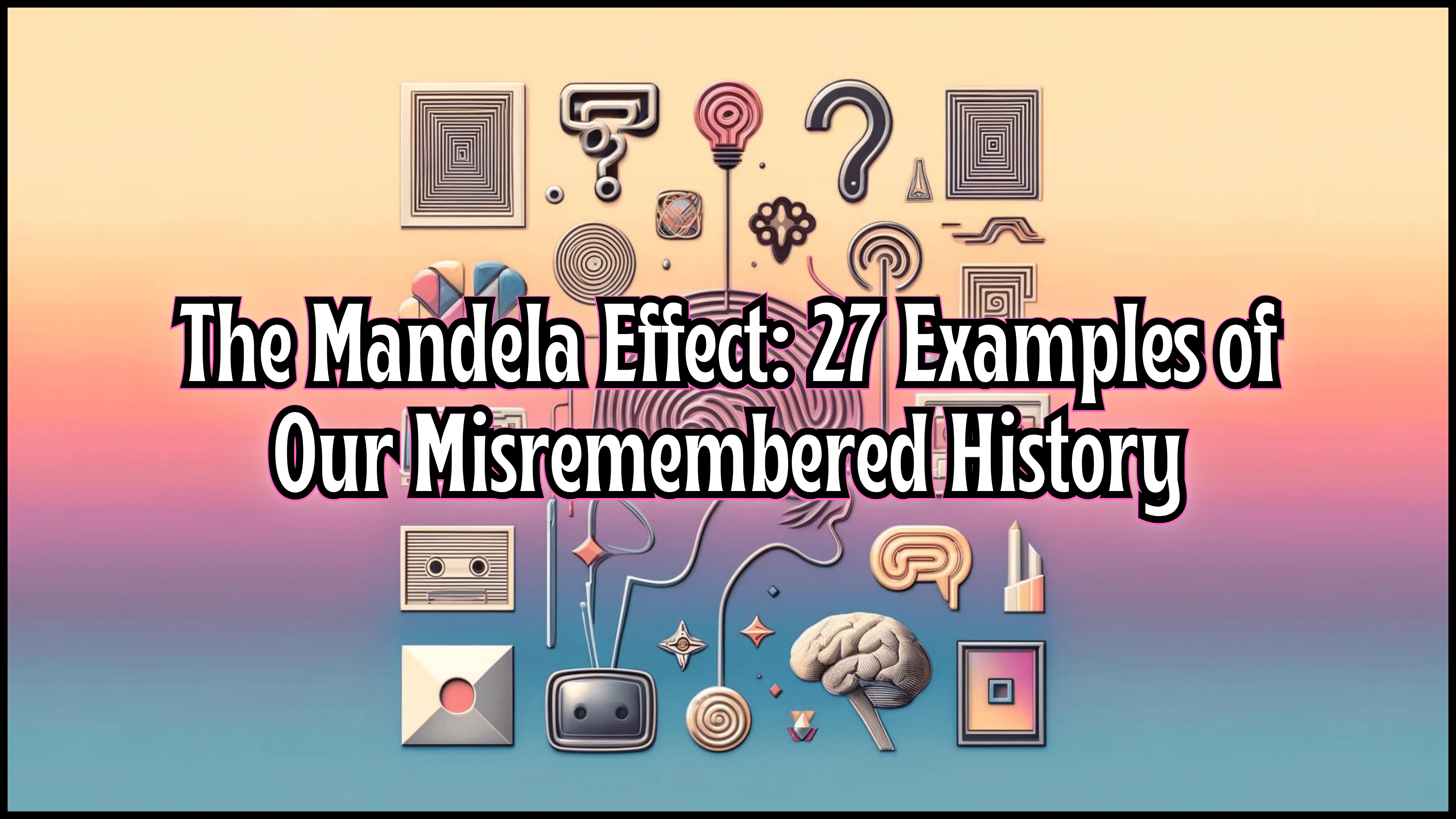The Mandela Effect: 27 Examples of Our Misremembered History
Have you ever sworn something to be true, only to find out you remembered it all wrong?
Welcome to the intriguing world of the Mandela Effect, a term that sounds like it belongs in a sci-fi novel rather than in our everyday discussions about retro nostalgia.
But here at Retro Relevance, we’re about to dive deep into this phenomenon that plays tricks on our collective memories, especially those from the 80s and 90s.
The Mandela Effect, Explained
The Mandela Effect refers to a situation where a large number of people remember something differently than how it occurred.
Fascinatingly, this term was coined in 2009 by Fiona Broome, a self-identified “paranormal consultant,” when she realized she wasn’t alone in misremembering Nelson Mandela’s death in prison in the 1980s.
Mandela, however, passed away in 2013, very much outside of prison walls.
A Brief Look into Its Origins
This realization sparked a wave of shared false memories, ranging from minor details in logos to misquoted lines in films.
But why is the Mandela Effect so captivating, especially to those of us who grew up in the 80s and 90s?
It’s because our nostalgia is about more that just what we remember; it’s about how those memories inform our current selves, and influences our collective experiences.
Before It Had a Name
Before the term "Mandela Effect" entered our vocabulary, there were plenty of instances that would now be classified under it.
Historical records are littered with examples of collective misremembering, demonstrating that this isn’t a new phenomenon—it’s just newly named.
Nostalgia’s Role in the Mandela Effect
For those of us who revel in the nostalgia of the 80s and 90s, the Mandela Effect takes on a unique significance.
It’s not merely a quirky oddity of human memory but a window into how our past experiences shape our present.
The era was filled with iconic moments, products, and media that have become fertile ground for Mandela Effects, perhaps because of the emotional weight they carry in our lives.
In a world where the past is a YouTube click away, the Mandela Effect serves as a reminder that our memories are not just records of what happened. They are stories we tell ourselves, influenced by emotions, society, and, yes, even the technology of the times.
27 Examples of the Mandela Effect on Our Memories of 80s and 90s Pop Culture
The following list contains 27 examples of the Mandela Effect on our memories of 80s and 90s pop culture:
- “Jiffy” Peanut Butter that Never Was: Remember grabbing a jar of “Jiffy” peanut butter off of your shelf to satisfy a PB&J craving back in the day? Plot twist, it’s always been called “Jif” Peanut Butter. Could our brains be blending “Jif” with “Skippy” to craft this imaginary brand?
- The Rubik’s Cube Conundrum: Many swear it was “Rubix” cube, but surprise – it’s “Rubik’s Cube.” Perhaps our early experiences with mystery maps where ‘x’ marks the spot, led us astray in remembering Mr. Rubik’s puzzling invention.
- The City That Sex Built: Remember “Sex in the City?” Well, it’s always been “Sex and the City.” Maybe the “in” felt more… intimate, meshing better with our scandalous recollections of the show.
- The Missing Dash in Kit Kat: A dash in “Kit-Kat”? Sounds legit; but nope, it’s “Kit Kat.” Our minds might be inserting that dash for a tidier, more balanced look.

- “Hello, Clarice” or Just Good Mornings?: “Hello, Clarice” is the line we remember that Hannibal Lecter never said. It was actually “Good morning Clarice.” Maybe the former just sounded creepier, fitting our eerie memories of the movie.
- Pikachu’s Fashionable Black Tail: Many recall Pikachu’s tail having a black tip. However, its tail is all yellow. Could this be a case of Pikachu-envy, where we all just wanted his tail to have a bit of extra flair?
- The Berenstain Bears Switcheroo: “Berenstein” or “Berenstain”? Turns out, it’s “ain.” Maybe our brains prefer the more common “stein” ending, giving the bears a slightly more exotic heritage.
- Fruit of the Loom’s Phantom Cornucopia: The logo found on the tag of your undies back in the day featured a pile of fruit spilling out of a cornucopia right? Nope, there never was a cornucopia. Perhaps the bounty of fruit misled our minds into imagining this horn of plenty.
- Darth Vader’s Misquoted Revelation: “Luke, I am your father,” is iconic but incorrect. It’s “No, I am your father.” Maybe we just wanted to make sure everyone knew exactly who was talking to whom. Hard to believe Tommy Callahan remembered it wrong when messing around and imitating Darth during a bit of office happy time, before being rudely interrupted by Richard.
- Britney’s Skirt Color Mix-up: It’s iconic, Britney Spears’ skirt in “…Baby One More Time” – except some remember it as red plaid instead of its actual monochrome black. Maybe the schoolgirl vibe tricked our brains?
- Tom Cruise’s Sunglass-less Dance: We remember Tom sliding in with sunglasses in “Risky Business,” but he wasn’t wearing any. Perhaps the cool factor of sunglasses just naturally attached itself to this iconic dance scene in our minds.
- The Monopoly Man’s Missing Monocle: Rich Uncle Pennybags without a monocle? That’s right, the Monopoly Man does not wear a monocle and must have 20/20 vision. Maybe we conflated him with Mr. Peanut, the peanut industry’s top-hatted gentleman.
- C-3PO’s Golden Ensemble: Everyone’s favourite snivelling droid C-3PO is all gold, right? Wrong. He sports a silver leg. Our love for all that glitters might be blinding us to the truth.
- Sinbad’s Genie Movie That Wasn’t: Many recall Sinbad starring as a genie in a movie titled: “Shazaam,” but the closest reality gets to this illusion of the mind, is when Shaq stars in a genie movie called “Kazaam.” Maybe Sinbad’s pirate-esque attire led us to believe he could also rock a genie lamp.

- Tinkerbell’s Missing Signature Move: The memory of Tinkerbell dotting the ‘i’ in Disney’s intro is strong but false.
- The Flintstones’ Name Game: “Flintstones” or “Flinstones”? It takes some serious elbow grease to chisel it into a piece of slate, so you better make sure you know how to spell it right the first time. The former is correct, but removing a ‘T’ feels more streamlined, no?
- Name that Looney Toon or Tune? “Looney Toons” seems right but it’s “Tunes.” Perhaps we can blame the spelling of “Tiny Toon Adventures” for this mix-up.
- Froot Loops vs. Fruit Loops: It’s “Froot Loops,” folks. Our logical brains probably thought, “Fruit is real, froot is not, clearly, it must be a typo.”
- Forrest Gump’s Box of Chocolates: We all remember “Life is like a box of chocolates,” but it’s “was.” Forrest says “Life was like a box of chocolates.”
- Chick-Fil-A’s Spelling Bee: “Chik-Fil-A” without the ‘c’ seems right but it’s always been “Chick-Fil-A.” Maybe we’re just in the habit of simplifying spellings to make texting faster.
- Leonardo DiCaprio’s Premature Oscar: Many think Leo won an Oscar for “Titanic.” Reality? His first win came in 2016 for “The Revenant.” As big as the Titanic movie was, DiCaprio’s Oscar hopes sank before the award show’s credits rolled.
- Mr. Rogers’ Welcoming Words: We recall our favourite mild-mannered kids show host’s sing-songy phrase “It’s a beautiful day in the neighbourhood” kicking off each episode. However, Mr Rogers actually says “It’s a beautiful day in this neighbourhood.” Perhaps “the” just sounds more welcoming to us.
- Sally Field’s Misquoted 1985 Oscar Speech: The line “You like me, you really like me!” is iconic but incorrect. What Sally field actually said was “I can’t deny the fact that you like me, right now, you like me!” Could our love for drama be enhancing our memory?
- Curious George’s Imaginary Tail: Remember George swinging by his tail? Well, he doesn’t have one. Maybe our monkey brains just assumed all primates come equipped with tails.
- Sketchers or Skechers?: It’s “Skechers,” without the ‘t.’ We won’t draw this explanation out any longer than we need to.
- Febreze or Febreeze?: One ‘e’ or two? It’s “Febreze.” Maybe we just enjoy the fresh breeze smell so much, we added an extra ‘e.’
- Richard Simmons’ Headband (and wrist bands) that kept the sweat out of his eyes during oldies-infused aerobics sessions: Many remember Simmons donning a headband (and some remember wrist bands too), yet he never did in his VHS workout tapes. Could Richard Simmons Halloween costumes be rewriting our collective memory?
Conclusion
As we wrap up this strange journey through the Mandela Effect, it’s clear that this phenomenon is more than a footnote in the history of pop culture.
It’s a reflection of our humanity, our capacity for error, and our insatiable desire to connect with the past.
It’s also a good reminder to keep an open mind and be willing to listen to others experiences because as it turns out, we might need some help remembering things accurately.
There’s almost as many theories that could explain why our memories sometimes get mixed up as there are examples of the Mandela Effect.
If you are keen to learn more info, this is a good place to start: The Mandela Effect Debunked. But be weary, while some explanations seem rationale, there are some ideas out there that are… a little out there.
So what do you think? Do you have any examples of the Mandela Effect messing with your memories?
We'd love to hear from you on this strange phenomenon and look forward to seeing and responding to your comments. Please participate in the discussion by dropping a comment below.
Thanks for stopping by.
Have a rad rest of your day.
FAQs
What is the Mandela Effect?
The Mandela Effect is a phenomenon where a large number of people remember an event or detail differently from how it actually happened.
Why is it called the Mandela Effect?
It’s named after Nelson Mandela because the term was coined following the realization that many people falsely remembered him dying in prison in the 1980s.
How does nostalgia influence the Mandela Effect?
Nostalgia can amplify the Mandela Effect by enhancing the emotional significance of our memories, making us more likely to remember events in a way that aligns with our feelings rather than the facts.
Can the Mandela Effect be explained by psychology?
Yes, psychological theories on memory formation and recall, such as confabulation and suggestibility, offer explanations for why the Mandela Effect occurs.
Are the 80s and 90s particularly prone to Mandela Effects?
The 80s and 90s hold a significant place in cultural nostalgia, making them ripe periods for the Mandela Effect due to the emotional connections many have with that era’s media and events.
Craig is a partner, and proud father of a teenage daughter, and two dogs. He's an avid blogger who loves researching and discussing 80s and 90s nostalgia. When not working on his website or hanging with his fam, Craig enjoys playing guitar, watching lacrosse, and being near water.

